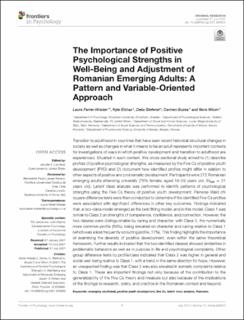| dc.description.abstract | Transition to adulthood in countries that have seen recent historical structural changes in society as well as changes in what it means to be an adult represents important contexts for investigations of ways in which positive development and transition to adulthood are experienced. Situated in such context, this cross-sectional study aimed to (1) describe profiles of positive psychological strengths, as measured by the Five Cs of positive youth development (PYD) and (2) document how identified profiles might differ in relation to other aspects of positive and problematic development. Participants were 272 Romanian emerging adults attending university (76% female; aged 19–29 years old, Mage = 21 years old). Latent class analysis was performed to identify patterns of psychological strengths using the Five Cs theory of positive youth development. Pairwise Wald chi square difference tests were then conducted to determine if the identified Five Cs profiles were associated with significant differences in other key outcomes. Findings indicated that, a two-class model emerged as the best fitting model, and in this model, Class 1 was similar to Class 2 on strengths of competence, confidence, and connection. However, the two classes were distinguishable by caring and character, with Class 2, the numerically more common profile (89%), being elevated on character and caring relative to Class 1 (which was a less frequently occurring profile, 11%). This finding highlights the importance of examining the diversity of positive development, even within the same theoretical framework. Further results indicated that the two identified classes showed similarities in problematic behaviors as well as in purpose in life and psychological complaints. Other group difference tests by profile/class indicated that Class 2 was higher in general and social well-being relative to Class 1, with a trend in the same direction for hope. However, an unexpected finding was that Class 2 was also elevated in somatic complaints relative to Class 1. These are important findings not only because of the contribution to the generalizability of the Five Cs theory and measure but also because of the implications of the findings to research, policy, and practice in the Romanian context and beyond. | en_US |

